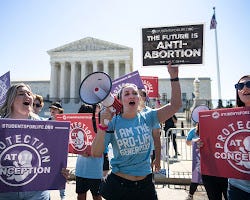
The Supreme Court’s overturning of Roe v. Wade, the landmark 1973 ruling that legalized abortion nationwide, is a significant development that is expected to have a major impact on abortion access in the United States. The decision, which was made in a 5–4 vote, means that individual states will now have the power to regulate or even outlaw abortion.
The Roe v. Wade decision was a landmark ruling that recognized a woman’s constitutional right to choose to have an abortion. The ruling was based on the principle that a woman has a right to privacy, and that the decision to have an abortion is a personal one that should be made between a woman and her doctor.
The Supreme Court’s decision to overturn Roe v. Wade has been met with both praise and criticism. Supporters of the decision argue that it will give states more control over the issue of abortion and allow for greater protection of the rights of the unborn. Opponents of the decision, on the other hand, argue that it will lead to a significant decrease in abortion access, particularly for low-income women and women living in rural areas.
The impact of the decision is expected to be felt across the country, with many states likely to pass new laws regulating or even outlawing abortion. This could lead to a patchwork of regulations across the country, with some states having much more restrictive laws than others.
The overturning of Roe v. Wade is likely to be a contentious issue for years to come, with both sides of the debate continuing to fight for their respective positions. It remains to be seen how the decision will ultimately impact abortion access in the United States and what the long-term consequences of the ruling will be for women’s rights.
No comments:
Post a Comment
Welcome to Leave a Comment